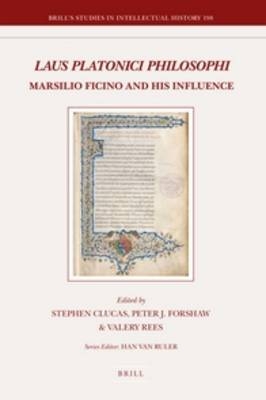
Laus Platonici Philosophi
Brill (Verlag)
978-90-04-18897-6 (ISBN)
This collection of essays honours Marsilio Ficino (1433-1499) as a Platonic philosopher. Ficino was not the first translator of Plato in the Renaissance, but he was the first to translate the entire corpus of Platonic works, and to emphasise their relevance for contemporary readers. The present work is divided into two sections: the first explores aspects of Ficino’s own thought and the sources which he used. The second section follows aspects of his influence in the sixteenth and seventeenth centuries. The papers presented here deepen and enrich our understanding of Ficino, and of the philosophical tradition in which he was working, and they offer a new platform for future studies on Ficino and his legacy in Renaissance philosophy.
Contributors include: Unn Irene Aasdalen, Constance Blackwell, Paul Richard Blum, Stephen Clucas, Ruth Clydesdale, Brian Copenhaver, John Dillon, Peter J. Forshaw, James Hankins, Hiro Hirai, Sarah Klitenic Wear, David Leech, Letizia Panizza, Valery Rees, and Stéphane Toussaint.
Stephen Clucas, PhD (1987), University of Kent at Canterbury, is Reader in Early Modern Intellectual History at Birkbeck, University of London. He has published widely in early modern history of science and history of philosophy, including John Dee: Interdisciplinary Studies in English Renaissance Thought (2006). He is Editor (with Stephen Gaukroger) of Intellectual History Review. Peter J. Forshaw, PhD (2004), University of London, is Assistant Professor for History of Western Esotericism in the Early Modern Period at the University of Amsterdam. His research and publications focus on the relation of occult philosophy to science and religion. Valery Rees is well known in the field of Ficino studies. She has been engaged in the translation project of Ficino's Letters at the School of Economic Science for the past thirty five years. She has published extensively on many aspects of his work as well as wider Renaissance issues.
Acknowledgements
Notes on Contributors
Introduction
PART I: THE PHILOSOPHY OF MARSILIO FICINO
Ficino and the God of the Platonists, John Dillon
Monstrous Melancholy: Ficino and the Physiological Causes of Atheism, James Hankins
‘Quo vertam oculos ut te laudem?’ Aspects of Praise in Ficino’s Writing, Valery Rees
The First Pico-Ficino Controversy, Unn Irene Aasdalen
‘Et nuper Plethon’ — Ficino’s Praise of Georgios Gemistos Plethon and his Rational Religion, Paul Richard Blum
Zoroaster and the Flying Egg: Ficino, Psellos and Gerson, Stéphane Toussaint
‘Jupiter tames Saturn’: Astrology in Ficino’s Epistolae, Ruth Clydesdale
Ficino’s Hymns and the Renaissance Platonic Academy, Sarah Klitenic Wear
PART II: THE INFLUENCE OF MARSILIO FICINO
Studied as an Oration: Readers of Pico’s letters, Ancient and Modern, Brian Copenhaver
Platonic Love on the Rocks: Castiglione Counter-Currents in Renaissance Italy, Letizia Panizza
John Dee’s Annotations to Ficino’s Translation of Plato, Stephen Clucas
Marsilio Ficino and the Chemical Art, Peter J. Forshaw
Earth’s Soul and Spontaneous Generation: Fortunio Liceti’s Criticism of Ficino’s Ideas on the Origin of Life, Hiro Hirai
Ficinian Influence on Henry More’s Arguments for the Soul’s Immortality, David Leech
Neo-Platonic modes of concordism versus definitions of difference: Simplicius, Augustinus Steuco and Ralph Cudworth versus Marco Antonio Zimara and Benedictus Pererius, Constance Blackwell
Bibliography
Index
| Erscheint lt. Verlag | 12.7.2011 |
|---|---|
| Reihe/Serie | Brill's Studies in Intellectual History ; 198 |
| Zusatzinfo | 1 Line drawings, black and white; 2 Illustrations, black and white |
| Verlagsort | Leiden |
| Sprache | englisch |
| Maße | 160 x 240 mm |
| Gewicht | 827 g |
| Themenwelt | Literatur ► Biografien / Erfahrungsberichte |
| Sachbuch/Ratgeber ► Geschichte / Politik | |
| Geisteswissenschaften ► Geschichte ► Regional- / Ländergeschichte | |
| Geisteswissenschaften ► Philosophie ► Philosophie des Mittelalters | |
| Geisteswissenschaften ► Religion / Theologie | |
| Sozialwissenschaften | |
| ISBN-10 | 90-04-18897-5 / 9004188975 |
| ISBN-13 | 978-90-04-18897-6 / 9789004188976 |
| Zustand | Neuware |
| Informationen gemäß Produktsicherheitsverordnung (GPSR) | |
| Haben Sie eine Frage zum Produkt? |
aus dem Bereich


